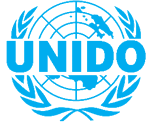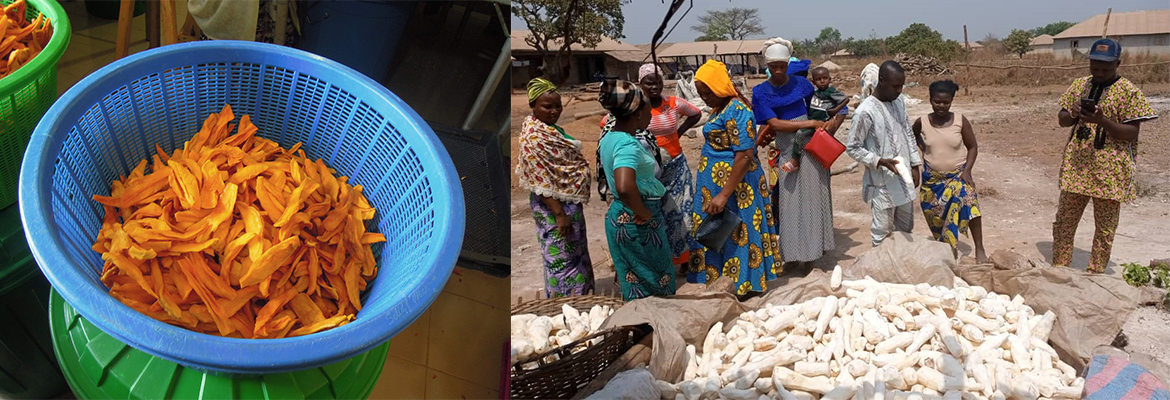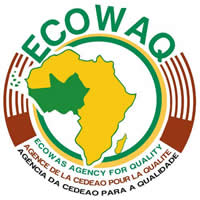





Cassava has enormous potential due to the diversity of processing possibilities. Fresh cassava, starch, gari straw flour, cassava chips, attiéké, cassava leaves, ethanol, fufu, sweetener, agbelima, cassava semolina, placali, atoupkou, cassava broth and peelings were identified. Mango puree, nectar and juice are generally sold on national and regional markets. Dried mango is difficult to position on international markets because it is not well known.
The vision of West Africa's industrialization is based on the
implementation of strategic actions defined at the highest
level. This includes the development of sustainable value
chains by strengthening the capacity of member States to
formulate and implement industrial development policies
along value chains.
Priority sectors have been selected at regional level for
support under the WACOMP. These value chains are
cassava and its derivatives, mango, textiles and clothing,
and information and communication technologies (ICTs) as
a cross-cutting sector.
The support will focus on processing, access to regional
and international markets and the implementation of the
regional policy framework for the development of value
chains, as defined in the ECOWAS Industrial Strategy,
aimed at strengthening West Africa's competitiveness and
better integrating it into the regional and international
trading system.
To this end, WACOMP conducted, with the support of
UNIDO, a needs assessment of quality infrastructure in all
four value chains. For the purposes of this edition, the
focus will be on mango, cassava and their by-products.
However, major constraints hinder the promotion and
marketing of these products outside the producing
countries (90% are produced in Benin, Côte d'Ivoire, Ghana
and Nigeria). The lack of structuring of the sector, the
uniformed quality of the products and the almost
inoperability of the dedicated infrastructures are the main
obstacles.
Mango is mainly sold fresh on local markets or exported to
European markets (more than 400,000 tonnes). Mangoes
from Burkina Faso, Côte d'Ivoire and Mali are increasingly
transported by continental routes to Morocco via
Mauritania and to Algeria via Niger.
Despite the various supports the sector has already
received, it continues to suffer significant losses in
production (25 to 70% depending on the case) due to
agricultural practices, the significant lack of processing
and preservation infrastructure and competition on the
international market.
It is therefore necessary to operationalise the quality
infrastructure at national and regional level to support
these two value chains effectively, to ensure the
competitiveness of the products concerned in markets
requiring high quality standards. Both sectors face
technical, organizational and commercial challenges. It is
around these axes that support will need to be articulated
by addressing the needs below:
| Cassava Value Chain | Mango Value Chain |
| ● 31 standards to be developed ● 16 technical regulations to be developed |
● 10 standards to be developed ● 4 technical regulations to be developed |
| ● 23 testing methods to be harmonised ● 20 laboratories to be supported in terms of accreditation, training and equipment ● 21 training sessions requested by the laboratories |
● 4 testing methods to be harmonized ● 34 laboratories to be supported in terms of accreditation, training and equipment ● 16 training sessions requested by the laboratories |
| ● 16 training sessions requested by inspection bodies ● 7 inspections bodies to be supported towards accreditation and provided with equipment |
● 8 inspections bodies to be supported for accreditation and provided with equipment |
| ● Capacity building (training and support for certification) for key actors | ● Capacity building (training and support for certification) for key actors |
In addition, the results of this study have facilitated the understanding of the constraints to the competitiveness of the two sectors and will enable WACOMP to better plan its local and regional interventions.
 This program is funded by the European Union with the technical support of UNIDO, the implementing Agency
This program is funded by the European Union with the technical support of UNIDO, the implementing Agency
The views expressed in this publication do not necessarily reflect those of the Commision of the European Union




Copyright - 2019 - ECOWAS AGENCY FOR QUALITY